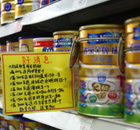Top News
Opinions are respected, but should come peacefully
(Xinhua)
Updated: 2009-12-18 21:28
 |
Large Medium Small |
Chen Yunlin, president of the mainland's Association for Relations Across the Taiwan Straits (ARATS), told reporters he would exchange opinions with his Taiwan counterpart Chiang Pin-kung on the principles of negotiation on the Economic Cooperation Framework Agreement (ECFA) when they met in Taichung, Taiwan on December 22.
The meeting between Chen and Chiang, chairman of Taiwan's Straits Exchange Foundation (SEF), will be the fourth round of talks between the two groups since they resumed negotiations in June last year after a 10-year suspension.
Negotiation on signing the agreement was not on the agenda of the meeting, Chen said, adding talks on such a deal were purely an economic issue and would not "touch upon any politically sensitive issues."
"We respect the rights to the expression of opinions of those who might oppose the talks between the ARATS and SEF, but we hope they could express their thoughts in a peaceful and rational way, and should not bring inconvenience to the life and work of Taichung residents," he said.
| ||||
The agenda of the talks includes labor cooperation in the fishing industry, cooperation in inspection and quarantine of agricultural products, and taxation cooperation.
The ARATS and the SEF are authorized by authorities in the mainland and Taiwan to handle cross-Straits issues.
Chen said one of his biggest wishes was to meet survivors of Typhoon Morakot in August.
He said the mainland appreciated the SEF's move of sending a delegation to the mainland to visit survivors after southwestern Sichuan Province was hit by a massive earthquake in May last year.
Chen also said the mainland was ready to promote communication over investment in Taiwan, which he said would greatly contribute to the improvement of Taiwan's economy and people's livelihood.
The island gave green lights to mainland companies' investment in June. Chen said he hoped Taiwan could gradually expand mainland investment's destinations and create a fairer and more convenient business and living environment for mainland investors.
He said the ARATS delegation included heads of scores of mainland companies, covering fields such as high-tech, petrochemical, electronics and steel industries.
"We will organize more visits to Taiwan for mainland companies to look for investment opportunities," he said.
During the delegation's trip, the two organizations are scheduled to hold a symposium on December 23 on the mainland investment to Taiwan.









